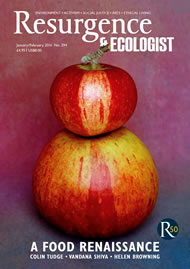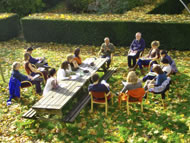As I walked up the drive to Schumacher College, I saw a bright green conker-case nestled on a strip of birch bark, perched on a pillar. Each little spike had been carefully studded with a scarlet yew berry. The tiny exuberant artwork is typical of the spontaneous creativity you see everywhere at Schumacher – “Art is our wild animal” is written on one wall.
By the door, it says ‘Welcome’ in many languages. Welcome to this Green University, a college-community devoted to ecology, spirituality, art and the cultivation of fellowship and vegetables. There should be a caution on the other side – a positive warning – Schumacher May Change Your Life.
People often describe Schumacher as if it were a person: communicative, convivial, curious, clever, courageous, compassionate and creative. It engages people, catalyses them, supports them, nourishes and delights them. “When I arrived, I felt a broad, warm embrace, a feeling that I belonged,” said one ex-participant. “It’s like being part of an interactive theatre,” says William Thomas, house manager for nearly all of the 25 years since the college opened its arms to students in January 1990. People learn together and live together, and there is a strong code of hospitality, but it is also hospitable to ideas, books and learning in the widest sense.
Jon Rae, the director of the college, who is universally admired for his calm, shining ability to curate rather than dictate, comments: “There is without doubt a glow that is emanating from here,” for while, as he says, Schumacher is part of a global movement for change, “there are so few places that encourage ecosophy – the ecological wisdom that we each have as indigenous human beings. Schumacher takes a position, and that for me is desperately important: that it explicitly stands for the parallel values of other living species and the planet.”
Satish Kumar, co-founder of the college and editor-in-chief of this magazine, describes its ambition then as now: “The college concentrates on the outside landscape of ecology and the inner landscape of spirituality to emphasise imagination and ethics. And we are all artists – in food, gardening and the art of living.”
Schumacher is housed in a 500-year-old manor house, with a large kitchen where everyone participates in cooking. (While I was there, it was the Day of Curly Kale, acres of the stuff: washing it in a giant sink was like flying over the Amazon.) There is a central lounge with a balcony full of huge plants, a honky-tonk piano, a large and beautiful stone sculpture, a woodstove, a wind chime and soft sofas. Opposite is a carefully and intelligently resourced library, and there are study-rooms, a TV room, a bar, and a meditation room with a secret cupboard lest holism get too earnest, containing dangling fish, shells, rocks, a tiny Kermit the Frog and a miniature wire bike.
The college is situated on the Dartington Hall estate on the edge of Dartmoor, near Totnes (‘twinned with Narnia’), home of the Transition movement. Transition’s founder, Rob Hopkins, has been a tutor here, as have a brilliant collection of makers and shapers. (A sign in the lounge reads: “This is your world. Shape it or someone else will.”) Visiting tutors have included Arne Naess, James Lovelock, Fritjof Capra, Vandana Shiva, Bill Plotkin, Alastair McIntosh, Iain McGilchrist, Matthew Fox, Polly Higgins, Alice Oswald and Paul Kingsnorth. No wonder David Abrams, also a tutor here, calls it “Hogwarts for grown-ups”. Bill McKibben admires “the intense but gentle learning, the respectful but challenging dialogue, the deep but practical thinking”.
It is named after E.F. Schumacher, famous for his examination of so-called Buddhist Economics – “economics as if people mattered”. It is strongly influenced by Rabindranath Tagore and his ethos of multi-disciplinary learning shaped in a community where the residential nature of the college means dialogue will cross-pollinate different minds and cultures and experiences.
Over lunch or supper or at the weekly soirées, or over the washing-up, you’d meet people on a variety of courses. There are four post-graduate programmes: Holistic Science (examining science that represents life as animate and non-mechanical), Economics for Transition (economics that is ethical and sustainable), Ecological Design Thinking (studying design that is aesthetic and ecological) and Ecological Food Systems.
There is a fascinating programme of short courses; one that immediately has me intrigued is Becoming Indigenous – even the title blooms with questions – which is led by Martin Shaw and Colin Campbell. Other short courses have included Ecosocialism; Terrapsychology; Ecocide; The Future of Farming; Exploring the Microcosmos – New Paradigms from Microbial Communities; Mindful Baking, Mindful Food; Finding Meaning in a Machine-led World; and courses on Myth and Initiation. There is a Right Livelihood course, working with the Centre for Gross National Happiness in Bhutan; other vocational courses, including Sustainable Horticulture; and an outdoor education programme, Call of the Wild, with partners at WildWise, which includes bushcraft, Nature awareness, storytelling and personal development.
If you’re lucky, you may also catch a Deep Time event with Stephan Harding, tutor of Holistic Science, who takes you on a 4.6-kilometre walk to represent 4.6 billion years, the age of the Earth. Every millimetre is one thousand years, and I tried to slide my foot forward just one millimetre and imagine the time from 1066 to now, give or take. Two millimetres, and we are already back to before the time of Christ. Nothing I have ever previously encountered has given me such an embodied knowledge of time so vast that my mind alone had not been able to hold it. But thinking with the help of my toes, I almost could. In this is a clue to something right at the heart of the character of education at Schumacher. Learning is not only intellectual, but also physical and emotional. (Listen closely to Harding’s description of bacteria, and you’re likely to fall in love with the wee things out of sheer admiration.)
Learning with the head, the hands and the heart is a much-heard mantra for something as subtle as it is humane; a practical alchemy. One can learn from the atmosphere of a place, through colours or the care of food; one can learn through the thoughtful timetable of the day, which includes meditation, gardening, study hours, housework groups and a large amount of free and flexible time; a timetable that in itself teaches the contrasting needs of the individual and the community: in the words of Emerson, every moment instructs.
Education is Schumacher’s raison d’être, and, says Jon Rae, “it genuinely supports peer-to-peer learning, in the sense that we are all learners and everyone has a contribution.” There is a quality of openness, not only to different people and ideas, but also to non-human teachers; one student says: “My prayer is for us to listen and act on the bees’ teachings.”
I write ‘student’ without thinking. I should have written ‘participant’, the word preferred by many at Schumacher, for the important nuance of underlining that everyone has something to teach as well as something to learn. Course participants tend to have a lot to give, being generous, strongly motivated, quick, keen, hard-working and curious. They are, says Rae, “agents of change”, and he notes that the real celebration is what Schumacher has caused people to do after leaving. At the moment, the college is organising ways for the 17,000 alumni to be able to connect with each other and potentially collaborate on mutual interests using an element of shared experience of what I’d call the Schumacher Effect.
Summing up the Schumacher Effect, one ex-participant, Morag Gamble, says: “My life’s work became visible to me.” This included setting up a sustainability initiative, SEED International. As a result of visiting Schumacher, Paul Dickinson devoted his life to climate-change activism, setting up the Carbon Disclosure Project. For the environmental sculptor Jim Carter, who creates powerful, profound renditions of the animal world and the mythic psyche, his time at Schumacher was an initiation: “It is like a womb, isolated from everything else but bringing things to birth.” For him, it was his birth as an artist.
Anyone who has taken a course at Schumacher can return as a volunteer, and in some ways they are the life of the college. “The volunteers are great – they kiss the wounded and do the washing-up,” says Martin Shaw, Schumacher’s mythologist-in-residence. (How’s that for a job title?) They play a big role in practical conviviality, providing a welcome or staffing the bar or the kitchen. All the food is vegetarian, local, organic and non-GM, and cooked by all. Bread is made on-site and competitive bread-making in the sourdough wars seems as close as the college gets to hostility.
By the coffee machine, a hub of conversation, there are two signs. One says “I love compost toilets”, demonstrating the pragmatic environmental aims of the college. The other illustrates its soul-questing character in a quote from Rumi: “Unfold Your Own Myth”.
Here, you can. When people say Schumacher may change your life, they mean it.
For more information on Schumacher College: www.schumachercollege.org.uk








